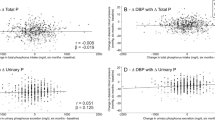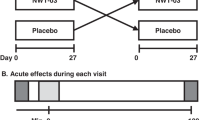Abstract
Observational and clinical studies suggest that high protein intake, particularly protein from plant sources, might reduce blood pressure (BP). To examine the association of dietary protein with BP, we analysed data from PREMIER, an 18-month clinical trial (n=810) that examined the effects of two multi-component lifestyle modifications on BP. We examined the association of protein intake with BP, and in particular the independent relationship of plant and animal protein with BP. Multivariable linear regression analyses were performed with both cross-sectional and longitudinal data. Dietary plant protein was inversely associated with both systolic and diastolic BP in cross-sectional analyses at the 6-month follow-up (P=0.0045 and 0.0096, respectively). Fruit and vegetable intake was also inversely associated with both systolic and diastolic BP cross-sectionally at 6 months (P=0.0003 and 0.0157, respectively). In longitudinal analyses, a high intake of plant protein at 6 months was marginally associated with a reduction of both systolic and diastolic BP from baseline to 6 months only (P=0.0797 and 0.0866, respectively), independent of change in body weight and waist circumference. Furthermore, increased intake of plant protein, and fruits and vegetables was significantly associated with a lower risk of hypertension at 6 but not at 18 months. Results of this study indicate that plant protein had a beneficial effect on BP and was associated with a lower risk of hypertension at 6 months. Our data, in conjunction with other research, suggest that an increased intake of plant protein may be useful as a means to prevent and treat hypertension.
This is a preview of subscription content, access via your institution
Access options
Subscribe to this journal
Receive 12 digital issues and online access to articles
$119.00 per year
only $9.92 per issue
Buy this article
- Purchase on Springer Link
- Instant access to full article PDF
Prices may be subject to local taxes which are calculated during checkout

Similar content being viewed by others
References
Obarzanek E, Velletri PA, Cutler JA . Dietary protein and blood pressure. JAMA 1996; 275: 1598–1603.
Iseki K, Iseki C, Itoh K, Sanefuji M, Uezono K, Ikemiya Y et al. Estimated protein intake and blood pressure in a screened cohort in Okinawa, Japan. Hypertens Res 2003; 26: 289–294.
Jenkins DJ, Kendall CW, Vuksan V, Vidgen E, Parker T, Faulkner D et al. Soluble fiber intake at a dose approved by the US Food and Drug Administration for a claim of health benefits: serum lipid risk factors for cardiovascular disease assessed in a randomized controlled crossover trial. Am J Clin Nutr 2002; 75: 834–839.
Elliott P, Stamler J, Dyer AR, Appel L, Dennis B, Kesteloot H et al. Association between protein intake and blood pressure: the INTERMAP Study. Arch Intern Med 2006; 166: 79–87.
Yamori Y, Kihara M, Nara Y, Ohtaka M, Horie R, Tsunematsu T et al. Hypertension and diet: multiple regression analysis in a Japanese farming community. Lancet 1981; 1: 1204–1205.
Kihara M, Fujikawa J, Ohtaka M, Mano M, Nara Y, Horie R et al. Interrelationships between blood pressure, sodium, potassium, serum cholesterol, and protein intake in Japanese. Hypertension 1984; 6: 736–742.
Zhou BF, Wu XG, Tao SQ, Yang J, Cao TX, Zheng RP et al. Dietary patterns in 10 groups and the relationship with blood pressure. Collaborative study group for cardiovascular diseases and their risk factors. Chin Med J (Engl) 1989; 102: 257–261.
Zhou B, Zhang X, Zhu A, Zhao L, Zhu S, Ruan L et al. The relationship of dietary animal protein and electrolytes to blood pressure: a study on three Chinese populations. Int J Epidemiol 1994; 23: 716–722.
Stamler J, Liu K, Ruth KJ, Pryer J, Greenland P . Eight-year blood pressure change in middle-aged men: relationship to multiple nutrients. Hypertension 2002; 39: 1000–1006.
Stamler J, Caggiula AW, Grandits GA . Relation of body mass and alcohol, nutrient, fiber, and caffeine intakes to blood pressure in the special intervention and usual care groups in the Multiple Risk Factor Intervention Trial. Am J Clin Nutr 1997; 65: 338S–365S.
Appel L, Moore T, Obarzanek E, Vollmer W, Svetkey L, Sacks F et al. A clinical trial of the effects of dietary patterns on blood pressure. N Engl J Med 1997; 336: 1117–1124.
Washburn S, Burke G, Morgan T, Anthony M . Effect of soy protein supplementation on serum lipoproteins, blood pressure, and menopausal symptoms in perimenopausal women. Menopause 1999; 6: 7–13.
Burke V, Hodgson JM, Beilin LJ, Giangiulioi N, Rogers P, Puddey IB . Dietary protein and soluble fiber reduce ambulatory blood pressure in treated hypertensives. Hypertension 2001; 38: 821–826.
Appel LJ, Sacks FM, Carey VJ, Obarzanek E, Swain JF, Miller III ER et al. Effects of protein, monounsaturated fat, and carbohydrate intake on blood pressure and serum lipids: results of the OmniHeart randomized trial. J Am Med Assoc 2005; 294: 2455–2464.
Hodgson JM, Burke V, Beilin LJ, Puddey IB . Partial substitution of carbohydrate intake with protein intake from lean red meat lowers blood pressure in hypertensive persons. Am J Clin Nutr 2006; 83: 780–787.
Funk KL, Elmer PJ, Stevens VJ, Harsha DW, Craddick SR, Lin PH et al. PREMIER—a trial of lifestyle interventions for blood pressure control: intervention design and rationale. Health Promot Pract 2008; 9: 271–280.
Appel LJ, Champagne CM, Harsha DW, Cooper LS, Obarzanek E, Elmer PJ et al. Effects of comprehensive lifestyle modification on blood pressure control: main results of the PREMIER clinical trial. [comment]. JAMA 2003; 289: 2083–2093.
The sixth report of the Joint National Committee on prevention, detection, evaluation and treatment of high blood pressure. Arch Intern Med 1997; 157: 2413–2446.
Washburn RA, Jacobsen DJ, Sonko BJ, Hill JO, Donnelly JE . The validity of the stanford seven-day physical activity recall in young adults. Med Sci Sports Exerc 2003; 35: 1374–1380.
Stamler J, Caggiula A, Grandits GA, Kjelsberg M, Cutler JA . Relationship to blood pressure of combinations of dietary macronutrients. Findings of the Multiple Risk Factor Intervention Trial (MRFIT). Circulation 1996; 94: 2417–2423.
Stamler J, Elliott P, Kesteloot H, Nichols R, Claeys G, Dyer AR et al. Inverse relation of dietary protein markers with blood pressure. Findings for 10 020 men and women in the INTERSALT Study. INTERSALT Cooperative Research Group. INTERnational study of SALT and blood pressure. Circulation 1996; 94: 1629–1634.
Liu L, Ikeda K, Sullivan DH, Ling W, Yamori Y . Epidemiological evidence of the association between dietary protein intake and blood pressure: a meta-analysis of published data. Hypertens Res 2002; 25: 689–695.
Stamler J, Elliott P, Kesteloot H, Nichols R, Claeys G, Dyer A et al. Inverse relation of dietary protein markers with blood pressure. Findings for 10 020 men and women in the INTERSALT Study. Circulation 1996; 94: 1629–1634.
Yamori Y, Horie R, Tanase H, Fujiwara K, Nara Y, Lovenberg W . Possible role of nutritional factors in the incidence of cerebral lesions in stroke-prone spontaneously hypertensive rats. Hypertension 1984; 6: 49–53.
He J, Klag M, Whelton P, Chen J, Qian M, He G . Dietary macronutrients and blood pressure in southwestern China. J Hypertens 1995; 13: 1267–1274.
Cho MM, Yi MM . Variability of daily creatinine excretion in healthy adults. Hum Nutr Clin Nutr 1986; 40: 469–472.
Woods LL . Mechanisms of renal hemodynamic regulation in response to protein feeding. Kidney Int 1993; 44: 659–675.
Palloshi A, Fragasso G, Piatti P, Monti LD, Setola E, Valsecchi G et al. Effect of oral L-arginine on blood pressure and symptoms and endothelial function in patients with systemic hypertension, positive exercise tests, and normal coronary arteries. Am J Cardiol 2004; 93: 933–935.
Teede HJ, Dalais FS, Kotsopoulos D, Liang YL, Davis S, McGrath BP . Dietary soy has both beneficial and potentially adverse cardiovascular effects: a placebo-controlled study in men and postmenopausal women. J Clin Endocrinol Metab 2001; 86: 3053–3060.
Jenkins DJ, Kendall CW, Connelly PW, Jackson CJ, Parker T, Faulkner D et al. Effects of high- and low-isoflavone (phytoestrogen) soy foods on inflammatory biomarkers and proinflammatory cytokines in middle-aged men and women. Metabolism 2002; 51: 919–924.
Sagara M, Kanda T, M NJ, Teramoto T, Armitage L, Birt N et al. Effects of dietary intake of soy protein and isoflavones on cardiovascular disease risk factors in high risk, middle-aged men in Scotland. J Am Coll Nutr 2004; 23: 85–91.
Ge K . The Dietary and Nutritional Status of Chinese Population: 1992 National Nutrition Survey. People's Medical Publishing House: Beijing, China, 1996.
Bialostosky K, Wright JD, Kennedy-Stephenson J, McDowell M, Johnson CL . Dietary intake of macronutrients, micronutrients, and other dietary constituents: United States 1988–94. Vital Health Stat 2002; 11: 1–158.
Lin PH, Batch B, Svetkey LP . Nutrition, lifestyle and hypertension. In: Coulston AM, Boushey CJ (eds). ‘Nutrition in the Prevention and Treatment of Disease, 2nd edn. Academic Press: Baltimore, MA, USA, 2008, pp 551–574.
Streppel MT, Arends LR, Van'T Veer P, Grobbee DE, Geleijnse JM . Dietary fiber and blood pressure: a meta-analysis of randomized placebo-controlled trials. Arch Intern Med 2005; 165: 150–156.
Cleland SJ, Petrie JR, Ueda S, Elliott HL, Connell JM . Insulin as a vascular hormone: implications for the pathophysiology of cardiovascular disease. Clin Exp Pharmacol Physiol 1998; 25: 175–184.
Coudray C, Demigne C, Rayssiguier Y . Effects of dietary fibers on magnesium absorption in animals and humans. J Nutr 2003; 133: 1–4.
Greger JL . Nondigestible carbohydrates and mineral bioavailability. J Nutr 1999; 129 (7 Suppl): 1434S–1435S.
Keenan JM, Pins JJ, Frazel C, Moran A, Turnquist L . Oat ingestion reduces systolic and diastolic blood pressure in patients with mild or borderline hypertension: a pilot trial. J Fam Pract 2002; 51: 369.
Smit E, Nieto FJ, Crespo CJ, Mitchell P . Estimates of animal and plant protein intake in US adults: results from the Third National Health and Nutrition Examination Survey, 1988–1991. J Am Diet Assoc 1999; 99: 813–820.
Beilin LJ . Vegetarian and other complex diets, fats, fiber, and hypertension. Am J Clin Nutr 1994; 59 (5 Suppl): 1130S–1135S.
The seventh report of the Joint National Committee on Prevention, Detection, Evaluation and Treatment of High Blood Pressure. National Heart Lung and Blood Institute, NIH: Bethesda, 2004. 04–5230.
Chobanian AV, Bakris GL, Black HR, Cushman WC, Green LA, Izzo Jr JL et al. The seventh report of the joint national committee on prevention, detection, evaluation, and treatment of high blood pressure: the JNC 7 report. JAMA 2003; 289: 2560–2572.
Acknowledgements
Dr Yancy is supported by a Veterans' Affairs Health Services Research Career Development Award (RCD 02-183-1).
Author information
Authors and Affiliations
Corresponding author
Rights and permissions
About this article
Cite this article
Wang, Y., Jr, W., Yu, D. et al. The relationship between dietary protein intake and blood pressure: results from the PREMIER study. J Hum Hypertens 22, 745–754 (2008). https://doi.org/10.1038/jhh.2008.64
Received:
Revised:
Accepted:
Published:
Issue Date:
DOI: https://doi.org/10.1038/jhh.2008.64
Keywords
This article is cited by
-
Dietary amino acids and incidence of hypertension: A principle component analysis approach
Scientific Reports (2017)
-
Intake of total protein, plant protein and animal protein in relation to blood pressure: a meta-analysis of observational and intervention studies
Journal of Human Hypertension (2013)
-
Is fetal macrosomia related to blood pressure among adolescents? A birth cohort study in China
Journal of Human Hypertension (2013)
-
Dietary Approaches to Prevent Hypertension
Current Hypertension Reports (2013)
-
Protein and Coronary Heart Disease: The Role of Different Protein Sources
Current Atherosclerosis Reports (2011)



